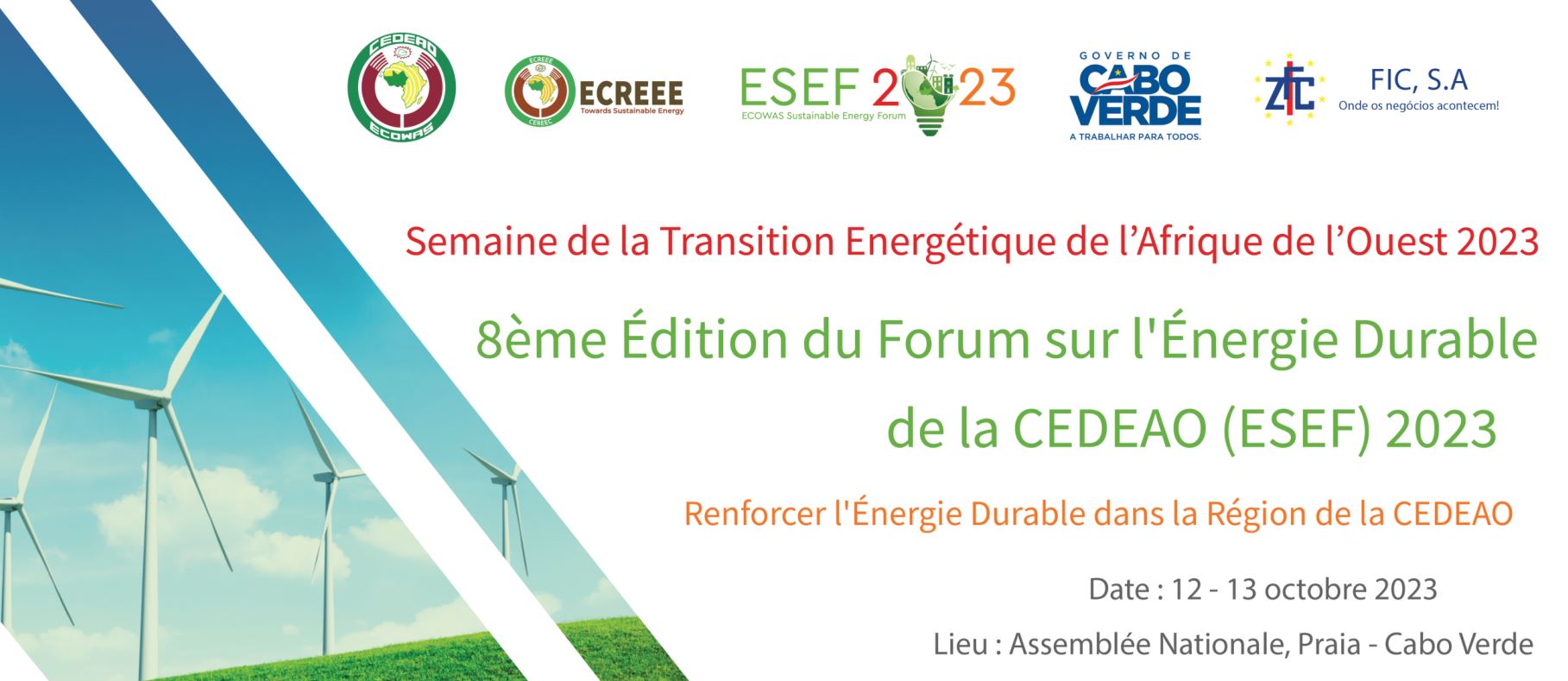The ECOWAS Commission organizes the 8th edition of the ECOWAS Sustainable Energy Forum (ESEF) and the launch of the Regional Off-Grid Electricity Access Project on 12 October 2023 in Praia, Cabo Verde
02 Oct, 2023The ECOWAS Commission through its Centre for Renewable Energy and Energy Efficiency (CEREEC) is organizing the 8th edition of the ECOWAS Sustainable Energy Forum (ESEF 2023) on October 12 and 13, 2023 in Praia, Cabo Verde on the theme “Empowering Sustainable Energy in the ECOWAS Region”. This edition is organized in collaboration with the Cabo Verde Ministry of Industry, Commerce and Energy, and will be marked by the launch of the Regional Off-Grid Electricity Access Project (ROGEAP). ESEF 2023 is held under the patronage of the Office of the Prime Minister of Cabo Verde, as part of Energy Transition Week, which will take place from October 9 to 14, 2023 in Praia, Cabo Verde.
The ECOWAS Sustainable Energy Forum (ESEF) is one of the largest energy events in West Africa. It was initiated in 2016 by ECREEE to discuss and identify strategies to support investments and policy initiatives by ECOWAS member states. ESEF also promotes cooperation and partnerships to accelerate the establishment of a viable market for sustainable energy solutions in the ECOWAS region. It is also a platform for improving the policy and regulatory framework for private sector investment through the engagement of ECOWAS policy makers, regional and international private sector players and financial institutions.
The opening ceremony of the 2023 edition of ESEF will take place on Thursday October 12, 2023 in the city of Praia on the premises of the National Assembly of Cabo Verde, with the launch of the Regional Off-Grid Electricity Access Project (ROGEAP).
ROGEAP is a regional initiative implemented by the ECOWAS Commission and the West African Development Bank (BOAD), with the support of the World Bank. ROGEAP aims to increase access to sustainable electricity services in the 15 ECOWAS member states and 4 other African countries (Cameroon, Central African Republic, Mauritania, Chad), benefiting households, businesses and public community health and education infrastructures through a harmonized regional approach. It is financed by the World Bank, the Clean Technology Fund (CTF) and the Dutch Cooperation (DGIS) for an amount of 338.7 million USD and aims to provide technical and financial support to develop the regional market for off-grid solar systems in West and Central Africa.
In line with the objectives of ESEF 2023, ROGEAP will also be organizing the first face-to-face meeting of the “Community of Champions” initiative for West Africa (plus Mauritania, Chad, Cameroon and the Central African Republic) with governments and the private sector on Friday October 13 in Praia, to discuss the challenges facing the off-grid solar energy market in the region.
The “Community of Champions” is a platform supported by the World Bank/ESMAP, Shell Foundation, USAID/Power Africa, AECF, SE4All and GOGLA to facilitate ongoing exchange, primarily between governments, the private sector and development partners, to collaborate in creating a favorable policy environment through best practices and experience sharing to contribute to universal access to energy in Sub-Saharan Africa.
The Community of Champions currently comprises 21 member countries (Burundi, Ethiopia, Kenya, Madagascar, Malawi, Niger, Nigeria, Rwanda, Senegal, Togo, Uganda, Zambia, DRC, Somalia, Mali, Ghana, Sierra Leone, Burkina Faso, Liberia, Mozambique and Zimbabwe) and 3 regional organizations: the ECOWAS Centre for Renewable Energy and Energy Efficiency (ECREEE), the East African Centre of Excellence for Renewable Energy and Energy Efficiency (EACREEE) and the SADC Centre for Renewable Energy and Energy Efficiency (SACREEE).
In its eight years of existence, the ECOWAS Sustainable Energy Forum (ESEF) has established its reputation as the benchmark event for energy players in West Africa and the world, bringing together over 1,000 players over the years, including heads of state, ministers, heads of development organizations, financial institutions, the private sector and academia and research, all of whom are recognized leaders in the field of energy and climate.

















